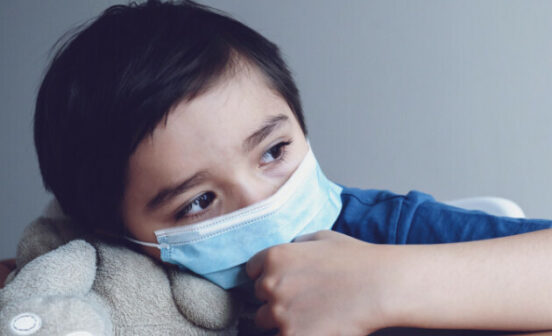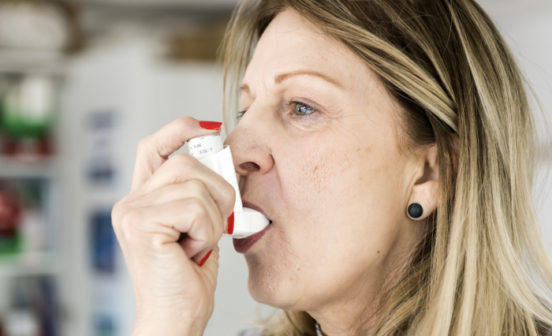Lung disease is common and limits the quality and quantity of life. Adopting a life-course approach, we aim to understand, predict and prevent respiratory and allergic diseases, both chronic and acute. By applying convergent science and bringing together different fields of study, we will address major unmet needs with the development of new biomarkers and therapies for early and advanced respiratory diseases.
Why this Research is Needed
Lung diseases are common, affecting more than 12 million people in the UK, and they are burdensome, accounting for one in two hospital admissions and one in five deaths. They impact disproportionately on the very young, elderly, poor and underserved. Air pollution, which is common in urban environments such as northwest London, causes 6.5 million deaths worldwide per year, and is predicted to double by 2050.
Research in lung disease is underfunded, with low levels of charitable support and commercial investment. Embedded within the northwest London community, this theme aligns respiratory expertise at the National Heart and Lung Institute and adjacent hospitals to ensure that lung disease research remains a top priority. Through our research programme, we aim to optimise the respiratory health of the population.
Theme Aims
- To define factors influencing lung disease onset, severity, and progression across the life-course. This addresses the questions: ‘Why me?’, ‘Will my kids be next?’, and ‘How can I best help myself?’
- To predict risk factors for acute respiratory infection and identify triggers of exacerbations (flare-ups) of chronic lung diseases. Such episodes are dreaded by patients and represent a major healthcare burden.
- To improve healthy life expectancy for patients living with or at risk of severe respiratory disease, we will develop new, advanced therapies that enable the right new treatments to be delivered to patients in a personalised fashion.
Detailed objectives can be found here
Upcoming /Ongoing Projects within the Theme
Project 1: Recurrent wheeze in pre-school children: Drs Saglani/Lloyd/Bush/Thwaites/Fontanella study early infections and maturity in the lungs’ immune systems to identify factors which predict asthma, seeking distinctions between those related to long-term persistence and resolution.
Project 2: The United Cohorts Research Network (UNICORN; www.unicornstudy.co.uk/programme). Led by Dr Custovic, in collaboration with Drs Cullinan/Fontanella/Saglani, UNICORN applies advanced statistical analyses to large datasets from patient groups to define signals associated with onset, progression, and severity of allergic disease and asthma.
Project 3: Respiratory Data Hub. In partnership with Health Data Research (HDR)-UK Drs Quint/Jarvis/Amaral/Bloom are establishing this resource, defining the prevalence and nature of respiratory illness and associated health conditions in our diverse north west London population (https://www.hdruk.ac.uk/helping-with-health-data/health-data-research-hubs/breathe/).
Project 4: Early COPD cohort: researchers will define clinical, imaging, and biomarker predictors of disease susceptibility and prognosis in ‘healthy’ smokers, Dr Wedzicha https://www.hra.nhs.uk/planning-and-improving-research/application-summaries/research-summaries/the-blf-early-copd-development-partnership-grant/)
Project 5: Viral infections: mechanistic studies will define the determinants of viral infection and secondary bacterial infection. This will be supported by our community surveillance (NW London-WISC database), NIHR-HPRU in Respiratory Infections (Drs Lalvani/Zambon), natural infection studies in children and adults (Drs Openshaw/Johnston/Thwaites/Chiu), the Imperial-led HIC-Vac consortium, and our London COPD-Exacerbation Cohort (Dr Wedzicha).
Project 6: Impact of environment and pollution on lung health: this new study will recruit 100 households and establish a residential indoor-outdoor air quality sensor network to address whether behavioral change can reduce air pollution risk and improve health (Kelly/Mudway/Chung).
Project 7: Improving outcome measures for interventional clinical trials. We will validate remote lung-function monitoring (Drs Jenkins/Wickremasinghe/Saglani; https://gow.epsrc.ukri.org/NGBOViewGrant.aspx?GrantRef=EP/W002280/1), small airways physiology and imaging (Drs Usmani/Davies), to develop better/faster diagnostics and outcome measures for Phase 2/3 trials.
Project 8: Design and delivery of precision medicine trials including first-in-human studies of gene therapies for CF, alpha-1-antitrypsin deficiency and alveolar proteinosis (Drs Griesenbach/Alton/Davies) utilizing our proprietary lentiviral-vector platform.
Project 9: Through the NIHR/MRC-funded DEMISTIFI study we will develop a fibrotic multi-morbidity platform to identify drug-repurposing opportunities in IPF (Dr Jenkins; https://gtr.ukri.org/projects?ref=MR%2FW014491%2F1).
Patient and Public Involvement, Engagement and Participation
We will collaborate with six community partners to inform and monitor the delivery of the theme’s aims and objective against the Imperial Biomedical Research Centre’s (BRC) Public Involvement, Engagement and Participation (PIEP) strategy. This will involve monthly meetings between the community partners, the PIEP lead and the Patient Experience Research Centre (PERC). One community partner will attend quarterly theme management meetings to provide strategic advice and ensure PIEP is considered in all theme activities.
We will build relationships with local communities by attending community-led events where respiratory health has been identified as of interest to the local population. We will increase the visibility of respiratory research by engaging with PERC-led community events and support cross- cutting theme activity to maximise PIEP collaborations.
Equality, Diversity and Inclusion
An EDI (Equality, Diversity and Inclusion) champion will ensure that theme activity is representative of and accessible to our diverse staff and local population. We will ensure PIEP community partners are from diverse backgrounds. This will support the inclusion of underrepresented communities in our research and provide guidance and support for researchers on how to maximise PIEP activity in their research.
We will support staff from underrepresented backgrounds, including but not limited to ethnic minority groups, females, NMAHPP (non-medical, allied health professional and pharmacy) professionals, and early career researchers, in accessing opportunities. To support this, we have NMAHPP representation on the theme management committee and as the PPIEP lead. We will work closely with staff networks across Imperial College London and Imperial College Healthcare NHS Trust to promote research opportunities.
Key Individuals
-
Professor Jane Davies
Theme Lead, Respiratory & Professor of Paediatric Respirology & Experimental Medicine -
Professor Salman Siddiqui
Theme Lead, Respiratory; Clinical Chair of Respiratory Medicine -
Dr Shauna McKibben
PPIEP Lead; Allergy and Asthma Clinical Nurse Specialist, Imperial College NHS Trust, -
Professor Adnan Custovic
Clinical Chair in Paediatric Allergy -
Professor Clare Lloyd
Vice-Dean (Institutional Affairs); Faculty of Medicine -
Professor Gisli Jenkins
Margaret Turner Warwick Chair of Thoracic Medicine -
Professor Jennifer Quint
Professor of Respiratory Epidemiology -
Professor Mohamed Shamji
Professor of Immunology and Allergy -
Professor Peter Openshaw
Professor of Experimental Medicine -
Professor Sejal Saglani
Professor of Paediatric Respiratory Medicine -
Professor Uta Griesenbach
Professor of Molecular Medicine -
Professor Wisia Wedzicha
Clinical Chair in Respiratory Medicine

















